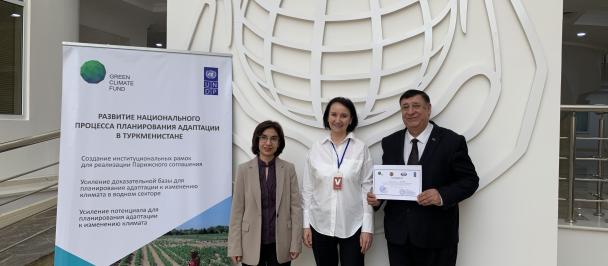UNDP proposes long-term adaptation activities for the most vulnerable sectors of the economy of Turkmenistan and delivers the roundtable to validate them with key stakeholders
May 17, 2024

UNDP proposes long-term adaptation activities for the most vulnerable sectors of the economy of Turkmenistan and delivers the roundtable to validate them with key stakeholders
Ashgabat, 15 May 2024: Within the framework of the project “Developing a National Adaptation Planning Process in Turkmenistan” implemented by the United Nations Development Programme (UNDP) with the financial support of the Green Climate Fund (GCF) in cooperation with the Ministry of Environmental Protection of Turkmenistan, the roundtable for presentation of the draft Adaptation Component for the next round of NDC of Turkmenistan was organized with participation of representatives of key national ministries, academia and civil society.
As defined by the UNDP international consultant Mr. Ivan Filiutsich, the main goal of the roundtable was “to present the updated adaptation component of the key national document defining the climate policy of Turkmenistan – the Nationally Determined Contributions (NDC) of Turkmenistan – and to discuss strategic issues related to climate change adaptation in the country.” The roundtable participants got an idea of the priority directions of scientific and technical policy on combating the negative effects of climate change. They were also introduced to a wide range of data sources on climate technologies, as well as the costs and benefits of their application.
As a party to the Paris Agreement, Turkmenistan consistently implements long-term measures aimed at reducing greenhouse gas emissions, as well as adapting the country's economic and social sectors to the long-term effects of climate change. Preparation of the NDC and its submission to the Secretariat of the United Nations Framework Convention on Climate Change (UNFCCC) is one of the obligations that Turkmenistan implements successfully. The updated adaptation component of the NDC consolidates the major results of various scientific studies and modeling results of the long-term effects of climate change in Turkmenistan. The current level of climate vulnerability of Turkmenistan was compared with other states using the advanced ND-GAIN methodology, which made it possible to objectively identify the main priorities of long-term climate policy in the country. An assessment of the potential costs and benefits of Turkmenistan from the implementation of adaptation measures in priority sectors for the period up to 2100 was carried out. Using the data of geographic information systems, the project experts studied in detail the geographically determined climatic vulnerabilities of velayats of Turkmenistan to accurately determine priority adaptation measures for each velayat.
As a result of all studies and assessments conducted by the project experts, over 100 adaptation activities were proposed and ranged based on the period and costs of implementation. In order to attract financial resources from international partners and donors to Turkmenistan for the further implementation of such activities, the project carried out a detailed analysis of the list of potential external sources of financing for climate projects in the country. 45 potential foreign sources of financing for climate projects, such as donor organizations, have been identified, which may be interested in cooperation with Turkmenistan in the implementation of adaptation and mitigation measures. The participants of the roundtable also exchanged views on the prospects for developing a Climate Financing Concept in Turkmenistan, which will be aimed at creating favorable conditions in the country for the implementation of a wide range of investment projects involving special mechanisms for the provision of resources.
During the event, special attention was paid to the close relationship of the project results with the future systematic work of Turkmenistan within the framework of the Enhanced Transparency Framework under the Paris Agreement.

 Locations
Locations



